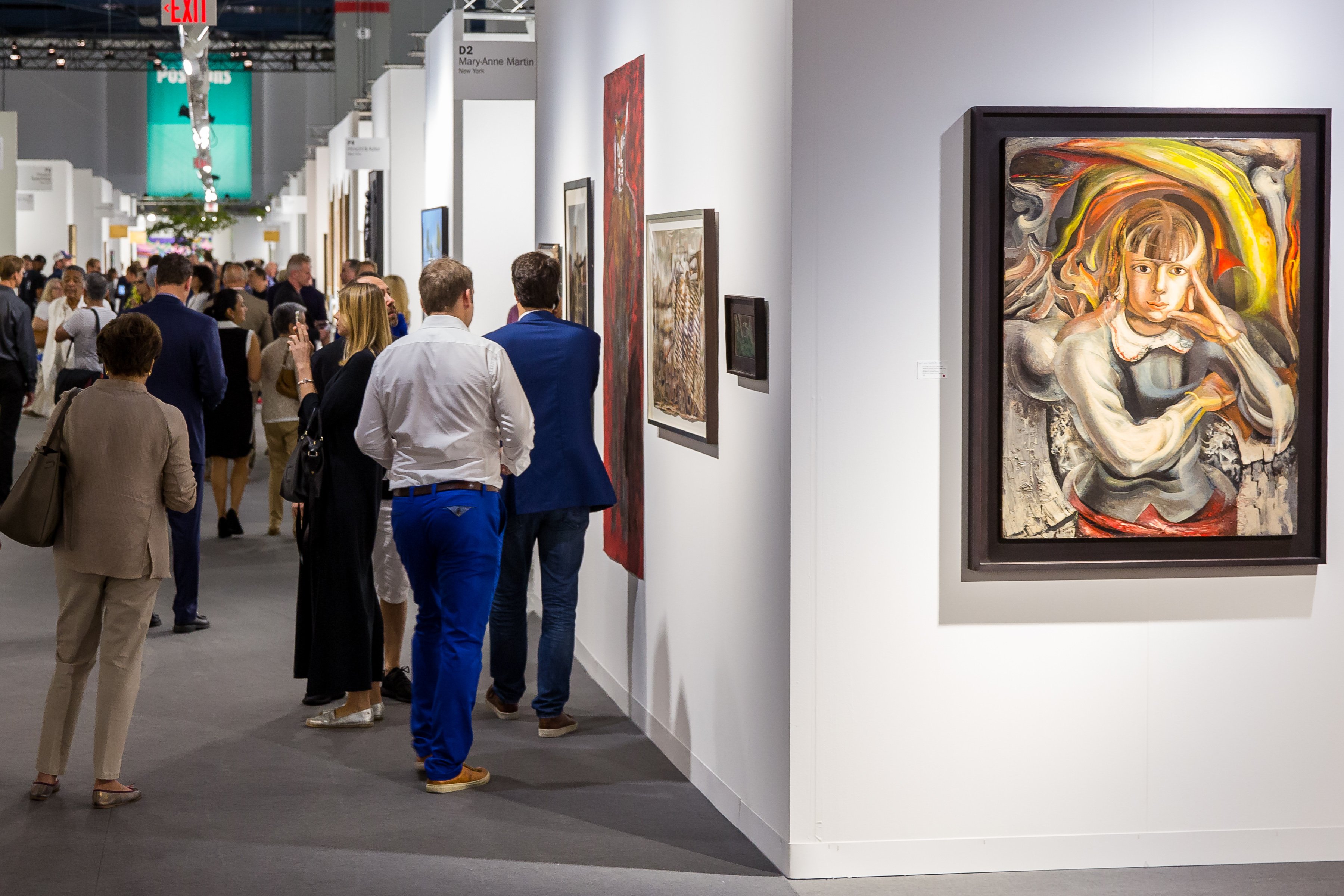
As is typical for the opening hours of each Art Basel in Miami Beach VIP preview, crowds were lining up at the main entrance gate waiting for the doors to open at 11:00 a.m., after which the sprawling fair saw an influx of eager viewers and buyers.
“The mood is good,” said Lisa Schiff, an art advisor who works with numerous high-profile collectors including many on the West Coast. “People are buying. If anything the fact that some people didn’t come this year was due to fears about Zika, and the overwhelming fall season we have had, rather than worries about the market. They just didn’t plan ahead.” Having said that, she conceded, “it doesn’t feel like 2014. We’re in a transition period. I’m trying to get my footing.”
Anthony Meier Fine Arts of San Francisco reported two sales “in the fair’s opening minutes.” The gallery, which is celebrating its 20th Anniversary this year, sold Gerhard Richter’s Quattro in the range of $75,000 to $100,000 and a Garry Simmons’s work, with an asking price of $60,000 to $75,000.
Emmanuel DiDonna, a 22-year art world veteran, was showing at Art Basel Miami Beach for the first time since branching out to establish his own gallery after a 17-year stint at Sotheby’s and later as director and partner of the New York gallery Blain | DiDonna.
Di Donna told artnet News that gaining access to the Art Basel marketplace was a major advantage. “I think access to some of the Latin American collectors is important, and it’s a good meeting place for the collectors we work with,” he said. “So far it’s been positive,” he continued, “good collectors have come through already and we made a number of sales.” Showing works by Calder, Cardeñas, Jean Arp and a standout sculpture by René Magritte, the dealer noted that the overall quality of the fair “seems to look good.”
Arshile Gorky, The Opaque (1947). © Arshile Gorky Foundation Courtesy the Foundation and Hauser & Wirth Photo: Genevieve Hanson
“We have had an outstanding first morning,” said Iwan Wirth, partner of Hauser & Wirth. “Our ‘American Master’ concept paid off, and seems to have really struck a chord with collectors. We’ve placed a number of multi-million-dollar works today. Among these is Arshile Gorky’s 1947 masterpiece The Opaque, which came from the artist’s family and has not been seen since 1965, as well as works by Mark Bradford and Jack Whitten. We are already thrilled with the fair this year.”
Dirk Bell, Hin Und Her at BQ Gallery of Berlin. Photo by Eileen Kinsella.
One of the standout booths in the main section was that of BQ Gallery of Berlin, which opted to display a trio of artists, including Dirk Bell, David Shrigley, and Friedrich Kunath.
As gallery partner Jörn Bötnagel explained, “We started to plan our stand with Dirk Bell, and through him we met Friedrich, since they had studied together. Shrigley was the perfect addition,” he says, because of the”painterly melancholy and humor” that ties the three artists’s works together.
Friedrich Kunath at BQ Gallery, Berlin. Photo by Eileen Kinsella
Bötnagel has been a longtime exhibitor at both the Switzerland and Miami versions of Art Basel for more than a decade. “We come to Miami especially because of the growing community here, including expansion in Florida itself to Fort Lauderdale and Naples that increasingly follow our artists as well as more collectors from Latin America, Central America, not to mention Los Angeles and Chicago.”
Installation of Amy Yao, Doppelgängers II (2016) made of rice, PVC rice, polyester resin, epoxy resin, freshwater pearls, and plastic pearls, at Various Small Fires Gallery in the “Positions” section of Art Basel in Miami Beach. Photo by Eileen Kinsella
A favorite of this year’s edition was the Positions section, which includes 16 galleries spotlighting a single artist..
For example, Los Angeles gallery Various Small Fires chose to highlight work by Amy Yao, whose work, director Sara Hantman explained, focuses on tragedies surrounding manufacturing, contamination, and environmental racism. A large pile on the floor, titled Doppelgängers II (2016) references an incident in China where consumers were sold a mixture of rice mixed with other materials–including cornstarch and PVC plastics—for consumption.
Installation of work by Maggie Lee at Real Fine Arts in the Positions section of Art Basel. Courtesy of Real Fine Arts, Greenpoint, New York,
Greenpoint Brooklyn gallery Real Fine Arts showed work by Maggie Lee, that turned the booth into a blown-up version of one of her smaller glass tanks, which tend to reference scenarios such as a 1970s teen girl’s room or an empty nightclub. “The idea is to make life-size versions of tank pieces,” said co-director Tyler Dobson to artnet News.
Beto Shwafaty at Prometeo Gallery of Milan. Photo by Eileen Kinsella
Brazilian artist Beto Shwafaty’s installation “An ability to create and destroy,” at Prometeo Gallery of Rome is another standout in the Positions section. The works refer to developmental processes linked to natural areas, reflecting the artist’s belief that “colonialism and modernism are different sides of the same coin, which means every act of progress may carry also an act of destruction,” whether of traditions, lands, or economic narratives, as gallery co-manager Cristina Rota explained.
Though the situations are connected specifically to Brazil’s history, they nonetheless reflect ongoing environmental problems around the world, as well as our consumerist tendencies.
Despite the sober subject matter, the sales keep rolling in. “The mood at the fair is reserved but positive, reminding me of Miami many years ago,” said Dan Desmond, a private wealth advisor with the Blue Rider Group at Morgan Stanley. “There are fewer, more serious collectors. From a sentiment perspective, there is still a lot of confidence in the art market—we just had a successful auction season and financial markets are rallying, both of which are helpful.”
Additional reporting by Henri Neuendorf.